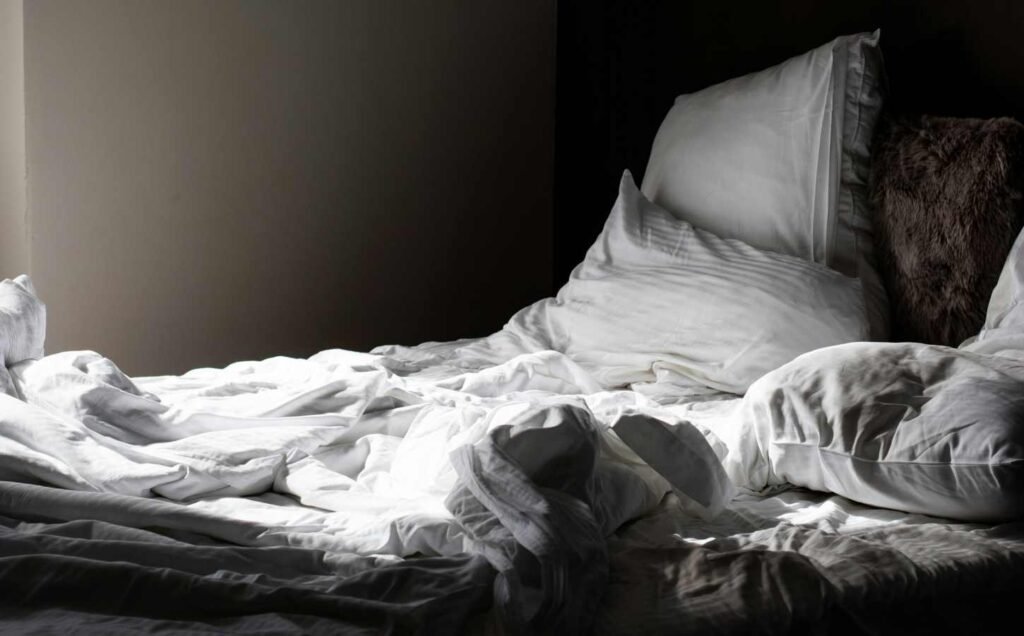Imagine waking up to find out you’ve engaged in sexual activities during the night without any recollection.
This unsettling scenario is a reality for individuals suffering from sexsomnia, a rare and potentially dangerous sleep disorder. Sexsomnia involves performing sexual behaviors while asleep, often leaving the person unaware of their actions.
Understanding sexsomnia is crucial for managing its impact on individuals and their relationships. Let’s explore what sexsomnia is, its symptoms, causes, and potential treatments.
What is Sexsomnia?
Sexsomnia, also known as sleep sex, is a type of parasomnia – an abnormal behavior during sleep. People with this condition do sexual activities like masturbation, fondling, or intercourse while asleep.
These activities happen without conscious awareness, and you have no memory of them when you wake up.
Symptoms of Sexsomnia
Identifying sexsomnia can be tricky because of its nocturnal nature and the shame factor. Here are the common symptoms:
- Unconscious Sexual Activity: Having sex during sleep, which can include masturbation, sexual moaning, and intercourse.
- Amnesia: There is no memory of the events that happened during the episode.
- Confusion Upon Waking: Feeling disoriented or confused if woken up during the episode.
- Distress and Embarrassment: Emotional distress or shame if a partner witnesses the behavior.
Causes
The exact causes of sexsomnia are not known, but the following may be contributing factors:
- Sleep Deprivation: Lack of sleep can increase the risk of parasomnias, including sexsomnia.
- Stress and Anxiety: High stress and anxiety can trigger episodes.
- Substance Use: Alcohol and recreational drugs can worsen sleep disorders.
- Other Sleep Disorders: Conditions like sleep apnea, restless legs syndrome, or other parasomnias can be associated with sexsomnia.
- Genetics: A family history of sleep disorders may increase the risk of sexsomnia.
Diagnosis and Treatment
If you or a loved one has sexsomnia, seek professional help. Here are the steps for diagnosis and treatment:
- Medical Evaluation: A complete medical evaluation, including a sleep study (polysomnography), to diagnose sexsomnia and rule out other sleep disorders.
- Lifestyle Changes: Improve sleep hygiene by having a regular sleep schedule, reducing stress, and avoiding alcohol and drugs to reduce episodes.
- Medications: In some cases, medications like antidepressants or benzodiazepines may be prescribed to manage symptoms.
- Therapy: Cognitive-behavioral therapy (CBT) to address underlying stress and anxiety causing the disorder.
- Safety Measures: Take safety precautions during sleep, such as locking the door or sleeping in separate beds, to prevent harm.
Relationships
Sexsomnia can affect relationships, causing distress and confusion for the affected person and their partner. Communication and support are key:
- Communicate: Talk to your partner so they can understand and support you.
- Seek Help Together: Couples therapy can be a safe space to address relationship issues caused by the disorder.
- Educate Yourself and Your Partner: Learn about sexsomnia so both of you can feel more in control and less anxious about it.
Conclusion: Understanding Sexsomnia
Understanding sexsomnia, and knowing the symptoms and causes is the first step to managing this tricky and distressing sleep disorder. By identifying the symptoms, getting the proper treatment, and communicating with your partner, you can minimize the effects of sexsomnia on your life and relationships.
If you have sexsomnia, don’t wait to seek help. With the proper support and strategies, sexsomnia can be managed, and you can sleep better and be better.
Understanding Parasomnias: Disruptive Sleep Disorders Explained

Parasomnias are sleep disorders that can disrupt an individual’s life. Understanding the symptoms, causes and treatment options is key to managing these conditions. By prioritizing good sleep hygiene, managing stress and getting professional help, those with parasomnias can get better sleep and overall health.
Continue reading: Understanding Parasomnias
Understanding Insomnia: Symptoms, Causes, and First Steps Towards Better Sleep

Insomnia can be a challenging condition, but understanding insomnia, its causes, and its symptoms is the first step towards overcoming it. By adopting healthier sleep habits and making changes to your lifestyle, you can start on the path to better sleep.
Continue reading: Understanding Insomnia
Improve Sleep Duration and Quality with Progressive Muscle Relaxation for Sleep

Using progressive muscle relaxation for sleep, is a simple yet powerful technique that can significantly enhance the duration and quality of sleep. By systematically tensing and relaxing your muscles, you can reduce physical and mental stress, making it easier to drift off into a restful sleep.
Incorporate progressive muscle relaxation into your nightly routine and combine it with good sleep hygiene practices to enjoy the full benefits of a rejuvenating night’s sleep.
Continue reading: Progressive Muscle Relaxation for Sleep



